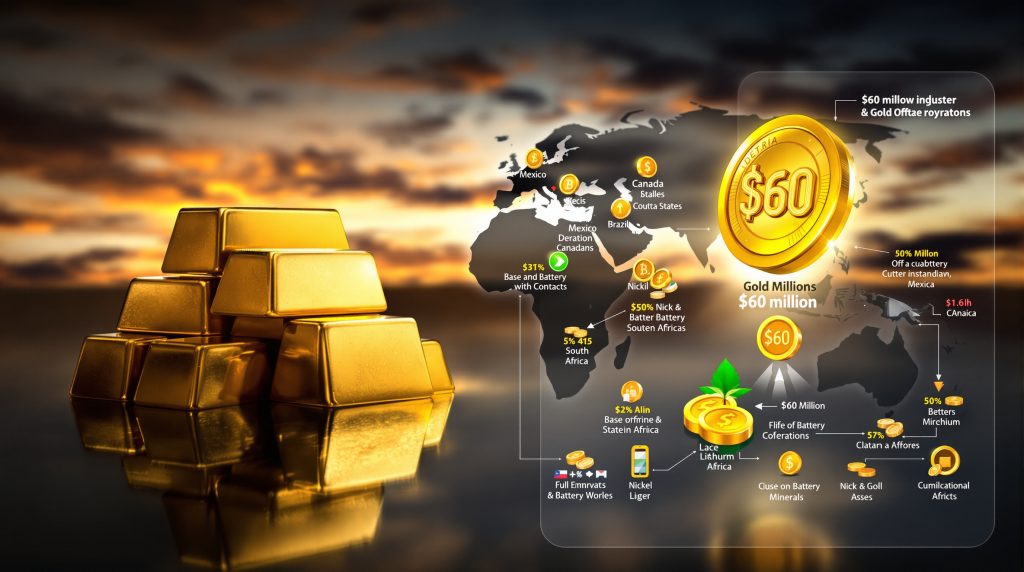How Did the Deterra-Vox Deal Unfold?
Deterra’s decision to offload gold contracts to Vox Royalty stands out as a strategic financial move with industry-wide reverberations.
The transaction’s total value is US$60 million (approximately A$91 million), with the bulk—US$56 million—attributed to gold offtake contracts and the remaining US$4 million related to significant royalty interests.
The assets predominantly originate from Deterra’s September 2024 acquisition of Trident Royalties, incorporating key gold royalties from projects like St Ives in Western Australia and Dandoko in Mali.
Deterra offloads gold contracts to Vox Royalty.
| Component | Value (USD) | Description |
|---|---|---|
| Gold Offtake Contracts | $56 million | Rights covering 6 operators, 10 operations |
| Royalties (St Ives, Dandoko) | $4 million | Revenue streams over selected gold projects |
| Total | $60 million |
The contracts encapsulate six operators and ten mines distributed across major gold-producing regions, including Mexico, Brazil, Canada, the United States, South Africa, and Côte d’Ivoire.
This global reach positions Vox to diversify and strengthen its gold royalty base.
A key part of the transaction is the 3% gross revenue royalty over certain St Ives tenements, paired with future rights contingent on Dandoko’s development.
These complex rights structures are increasingly common in royalty portfolio deals, highlighting the sophistication and evolving maturity of the resource royalties sector.
Why Is Deterra Shedding Gold Assets?
Deterra’s rationale for offloading these core gold assets is grounded in a multi-faceted strategic shift.
The company is imperative about pivoting toward opportunities in base, bulk, battery, and electrification minerals.
This realignment reflects an expanding consensus in the mining investment community: future value creation is closely tied to resources underpinning the global energy transition minerals and industrial decarbonisation.
Furthermore, Deterra offloads gold contracts to Vox Royalty.
Several factors support this move:
• Strategic Refocus: Concentrating on commodities central to renewable energy infrastructure, such as nickel, copper, and lithium, instead of legacy precious metals like gold.
• Market Momentum: Battery metals have outperformed gold in price growth and investor returns over the past several years, reflecting shifting demand patterns.
• ESG Imperatives: Companies face investor pressure to align portfolios with environmental, social, and governance goals, intensifying exposure to ‘future-facing’ minerals and reducing reliance on traditional gold assets.
• Portfolio Optimization: Divesting non-core assets releases capital, allowing for agile reinvestment into higher-growth sectors.
This industry trend is validated by numerous other royalty and streaming companies executing similar rebalancing strategies, adjusting portfolios in anticipation of evolving market demand.
What Assets Are Involved in the Transaction?
The Deterra offloads gold contracts to Vox Royalty transaction includes two principal asset types: gold offtake contracts and royalties over select tenements.
Gold Offtake Contracts: Geographic and Operational Profile
• Six Operators: Each representing diverse mining practices, management strategies, and regional conditions.
• Ten Mines: Located in Mexico, Brazil, Canada, United States, South Africa, Côte d’Ivoire—broadening both jurisdictional and operational diversification.
• Indexed Pricing: Each contract is tied to a minimum price index per gold ounce, allowing buyers to mitigate exposure to sudden price drops.
• Timed Sale Flexibility: Owners can exercise a 6–8 day window to sell delivered ounces, allowing calculated exposure to gold price volatility.
Royalties: Detailed Asset Structure
• St Ives (Western Australia): 3% gross revenue royalty on non-producing tenements, providing long-term upside as development advances.
• Dandoko (Mali): Covers an advanced exploration project, with contingent revenue potential on project success and future mine commissioning.
Geologically, these projects offer differentiated upside: St Ives is in a proven, high-grade district, and Dandoko represents exposure to West African greenstone belts known for favourable gold grades and scalability, though with commensurate exploration and country risk.
How Do Offtake and Royalty Contracts Work in Practice?
Understanding the nuances of these instruments is vital for investors:
Gold Offtake Contracts
• Definition: An offtake contract provides the holder the right to purchase a certain share of the mine’s gold output at a price indexed to broad market rates.
• Minimum Price Index: These contracts stipulate a floor price (the minimum index), enabling predictable baseline cash flows and protecting against sharp gold price declines.
• Flexible Sale Window: The ability to select a 6-8 day sales window means contract owners can optimise returns when market prices peak, while limiting downside in periods of volatility.
Royalty Agreements
• Gross Revenue Royalty (GRR): Pays the contract holder a set percentage of revenue (in this case, 3% for St Ives), usually irrespective of the mine’s profitability.
• Exploration-Linked Royalties: Royalties attached to early-stage projects (like Dandoko) are speculative, with value largely tied to successful resource conversion and the future production timeline.
Risk Profile Comparison:
• Offtake Contracts: Offer direct linkage to commodity pricing but may be subject to operational deliverability risks.
• Royalties: Provide consistent passive income streams with minimized operational oversight or liability, appealing to institutional and retail investors seeking commodity exposure without direct mine ownership risk.
What Financial Returns Has Deterra Achieved from These Assets?
Deterra’s offload of gold contracts to Vox Royalty is not just a headline-grabbing sale—it’s a demonstration of disciplined capital allocation and value capture in the minerals royalty space.
| Measure | Value (USD) |
|---|---|
| Net Revenue Since Trident Acquisition | $16.33 million |
| Pre-Tax Return on Sale | $13.3 million |
Since acquiring the portfolio from Trident Royalties in September 2024, Deterra has realised a net revenue of US$16.33 million across its gold offtake assets.
The latest divestment alone delivers US$13.3 million pre-tax to Deterra.
Furthermore, these gains represent an attractive annualised ROI, reflecting a gold market surge, outpacing traditional mining equities and many competing financial instruments across the sector during the holding period.
Financial performance has also benefited from gold price highs, as well as prudent contract structuring, with indexed pricing mitigating downside risk.
How Does This Shape Royalty Market Dynamics?
This transaction has cascading effects on both company strategies and the broader mining royalty market.
Impacts for Vox Royalty
• Portfolio Diversification: Vox meaningfully increases its yield-generating gold contracts, now securing exposure to a broad mix of international jurisdictions.
• Enhanced Cash Flow Stability: Immediate accretion in royalty revenue and offtake income across different risk regimes.
Industry and Market Trends
• Strategic Shift Toward Decarbonisation Commodities: The sector is witnessing accelerated migration away from gold-centric portfolios toward commodities underpinning electrification infrastructure, like lithium, nickel, copper, and rare earths.
• Increased Liquidity and Sophistication: Active trading and portfolio rebalancing of royalty and offtake rights underscores the maturing liquidity in this investment niche.
• Internationalisation: The cross-jurisdictional asset blend further intensifies as royalty companies seek balanced geopolitical exposure to ensure revenue continuity and regulatory mitigation.
Regulatory Considerations:
• Managing multi-country royalties requires rigorous due diligence on local mining codes, royalty entitlements, and transferability—a complex arena for investors and dealmakers alike.
Divesting legacy gold assets unlocks capital for redeployment into high-growth, low-carbon minerals central to the global resource transformation.
What Are the Implications for Investors and Industry Stakeholders?
The Deterra offloads gold contracts to Vox Royalty deal resonates strongly with both near-term investor sentiment and long-term portfolio management philosophies.
Deterra offloads gold contracts to Vox Royalty.
For Investors:
• Immediate Capital Realisation: Deterra has realised substantial cash returns for redeployment, supporting an agile response to sector opportunities.
• Enhanced Gold Leverage for Vox: Vox secures new leverage to gold price dynamics, bolstered by a gold sale agreement, adding both scale and jurisdictional diversity to its asset mix.
• Market Psychology: These deals reinforce the perception that value creation in mining royalties stems not only from commodity choice but also from sophisticated risk-adjusted portfolio structuring.
For Industry Stakeholders:
• The increasing internationalisation of portfolios signals intensifying competition for prime royalties and offtakes across jurisdictionally stable and emerging markets alike.
• The shift in sector focus could influence exploration financing, with capital increasingly channelled into projects supportive of electrification and renewable energy supply chains.
Regulatory and Hedging Considerations:
Managing multi-country royalties demands robust compliance with each country’s mining code and robust currency hedging strategies to insulate returns from exchange rate volatility.
ESG Dynamics:
Rebalancing toward battery metals and clean energy minerals aligns with shifting ESG criteria, potentially enhancing company appeal to institutional investors and lowering liquidity premiums in the public markets.
Frequently Asked Questions (FAQ)
What distinguishes gold offtake contracts from royalties?
Gold offtake contracts entitle holders to purchase a set share of mine output, typically based on indexed pricing. Royalties, meanwhile, grant the right to a stream of revenues or minerals from project production, often at a fixed percentage.
Why are mining royalty companies divesting gold for battery metals and bulk commodities?
With battery and electrification minerals expected to drive commodity demand growth, several companies are redeploying capital to assets with greater future relevance and ESG alignment.
How does this sale benefit each party?
Deterra receives immediate cash and refines its focus; Vox gains established, cash-generating gold interests spanning multiple continents.
Conclusion: What Does This Mean for Deterra, Vox, and the Future of Resource Royalties?
Deterra offloads gold contracts to Vox Royalty.
Deterra’s sale of gold contracts to Vox Royalty epitomises the industry’s ongoing evolution.
The deal represents both a calculated exit from legacy assets and a bold repositioning toward the minerals that will underpin the global energy transition.
For Deterra, this consolidates its future as a pure-play on base, bulk, and electrification minerals.
For Vox, the acquisition bets on sustained demand and attractive price dynamics in the gold sector, while aligning with broader industry evolution trends.
Moreover, this strategic move aligns with a recent global gold portfolio acquisition in the sector.
This transaction encapsulates the broader movement within mining royalties to balance yesterday’s reliable income with tomorrow’s exponential growth prospects.
Furthermore, projections indicate a robust gold price forecast amid ongoing market volatility.
Are You Ready to Explore Next-Gen Mineral Investing Opportunities?
Leverage Discovery Alert’s proprietary Discovery IQ model to stay ahead of the market with real-time alerts on breakthrough discoveries like Deterra’s strategic pivots. Dive into our discoveries page to understand how historic returns were achieved, and start your 30-day free trial today for an investment edge.




